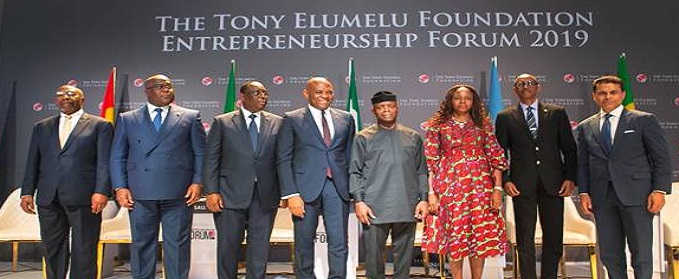News
Presidents, Global Leaders Tackle Job Creation, Others @ 2019 Tony Elumelu Foundation Entrepreneurship Forum

At the recently concluded 5th edition of the Tony Elumelu Foundation (TEF) Entrepreneurship Forum, five African Presidents and thousands of young African entrepreneurs converged at the most influential gathering in the African entrepreneurship ecosystem. Job creation and youth empowerment were the key themes tackled at the Forum.
The Tony Elumelu Foundation, which has been at the forefront of advocating for entrepreneurship as the catalyst for the economic transformation of Africa, convened the 2-day Forum on the 26th and 27th of July at the Transcorp Hilton Hotel, Abuja, Nigeria’s seat of government.
The event convened over 5,000 participants from 54 African countries, including representatives of the 7,521 beneficiaries of the Tony Elumelu Foundation Entrepreneurship Programme.
More than 60 global speakers from the public and private sectors across 3 continents participated in interactive masterclasses, plenary sessions and debates geared towards generating ideas and defining concrete steps Africa must take to empower its youth and accelerate the continent’s development.
Guests interacted directly with young budding entrepreneurs from across the 20 African UBA-present countries who exhibited their innovative products and solutions at the UBA Marketplace, powered by Africa’s global bank, United Bank for Africa (UBA).
Moderated by American journalist and host of CNN’s show, Fareed Zakaria GPS, the Presidential Debates, which formed the highlight of the two-day event, focused on charting the way forward towards the eradication of poverty in Africa through job creation.
The public sector leaders on the panel include H.E. Paul Kagame, President, Republic of Rwanda; H.E. Macky Sall, President, Republic of Senegal; H.E. Félix Tshisekedi, President, the Democratic Republic of Congo (DRC); H.E. (Prof.) Yemi Osinbajo (SAN), Vice President, Federal Republic of Nigeria; and Hon (Dr.) Ruhakana Rugunda, Prime Minister, Republic of Uganda, representing the President of Uganda, H.E. Yoweri Museveni.
Healthcare played a dominant role in the conversations as healthcare leaders in the public and private sectors tackled this theme on the plenary session “The Role of Healthcare in Economic Transformation”. Speakers on this panel include Dr. Awele Elumelu, Trustee, Tony Elumelu Foundation and Founder/CEO, Avon Medical Practice; H.E (Mrs.) Aisha Buhari, First Lady, Federal Republic of Nigeria, H.E (Mme.) Djena Kaba Condé, First Lady of Guinea; H.E. (Mme.) Keïta Aminata Maiga, First Lady, Mali; Gilles Carbonnier, Vice President, International Committee of the Red Cross (ICRC); Oulimata Sarr, Regional Director ai, UN Women Central and West Africa; and Dr. Tedros Adhanom Ghebreyesus, Director General, World Health Organisation.
At the Forum, Tony O. Elumelu, (CON), Founder of the Tony Elumelu reiterated the urgency in creating jobs on the continent to catalyse Africa’s development.
He said: “Extremism is a product of poverty and joblessness. Poverty anywhere is a threat to everyone everywhere,” he said. “If our leaders understand the reason and rationale for our youths to succeed, they will do everything they can to support them.”
Elumelu also reiterated the role of technology as a key enabler in accelerating development, citing TEFConnect, the digital networking platform for African entrepreneurs launched by the Tony Elumelu Foundation in 2018. With over 500,000 registered users, the hub provides a platform for entrepreneurs to network and forge business partnerships regardless of their location.
Giving the keynote speech, Vice President of Nigeria, H.E. (Prof.) Yemi Osinbajo commented on the impact of the Tony Elumelu Foundation: “By birthing this particular intervention, Tony Elumelu has compelled us to focus on what really matters, our youth and their dreams. The message to Africa’s emerging business giants is a clear one: How and what can you contribute, like Tony Elumelu, to empowering the next generation, helping them to realize their own dreams?”
The forum ended with a tour of the UBA Marketplace, where entrepreneurs across the continent exhibited their products, as a pitching competition saw the winner walk away with a $5,000 grant from the United Bank for Africa (UBA).
News
Experts Caution e-commerce Operators on Eco-friendly Materials

Experts have urged the Nigerian e-commerce industry to use eco-friendly materials in its packaging and logistics of products to reduce carbon emissions and protect the environment.

The experts made this known at a sensitisation workshop on Greening E-commerce orgainsed by The Sustainable and Inclusive Economic Development for Decent Employment In Nigeria Programme (SEDIN) – an initiative of the German Development Agency (GIZ) in partnership with Nigerian Postal Services (NIPOST).
The experts stressed the importance of e-commerce operators in Nigeria committing to concrete climate actions and sustainable operations.
Nnaemeka Ngwu, director of the public sector initiative and a professor at Lagos Business School, urged e-commerce companies to quickly adopt sustainable green technology to minimize their environmental harm.
“E-commerce is a business enabler and a platform through which many people can get involved in trade and commerce. However, e-commerce also brings lots of issues in sustainability and climate change because of pollution,” he said.
According to him, to improve the sustainability component of e-commerce, the country must promote better packaging and logistics among operators.
“We need to green the e-commerce industry to make it more inclusive and support the climate so that it does not cause risks and issues,” he explained.
He commended the Lagos State government on the ban on single-use plastics, calling for the policy to be complemented with awareness, advocacy, and engagement so that the public understands the reason for the policy.
He noted that such awareness should be done regularly, while urging the Nigerian Postal Service to use its leadership role in the courier industry to engage other courier businesses within the space on the benefits of sustainability and the packaging and logistics issues.
In her opening remarks, Titi Oshodi, special adviser to the Lagos State Governor on Climate Change and Circular Economy, called for awareness on greening across various sectors of governance, communities and the private sector
“This will ensure that people understand the rationale behind the policies on greening and they also understand what the alternatives are,” she noted.
“This is the reason why climate literacy is a front-boner strategy for us in Lagos State,” she added.
She explained that Lagos is a commercial hub that grew its GDP due to the operations of micro, small and medium-size businesses. “We need to have them empowered, more knowledgeable about sustainability practices.”
Tola Odeyemi, postmaster-general, Nigerian Postal Services (NIPOST), said the courier can play a strategic and vital role in greening the ecosystem, noting that it has 1,174 post offices nationwide.
Odeyemi, who was represented by Ernest Mamood, general-manager of EMS Parcel Nigeria, said NIPOST is a regulator in the country’s courier industry and can use its position to sensitize other operators in the industry on the use of eco-friendly materials in packaging and logistics to cut environmental impact.
News
Tech Alliance Aims to Transform Africa’s Mapping System

Space42, the UAE-based global AI-powered space-tech company, part of technology group G42, this week announced the signing of a memorandum of understanding with Microsoft and Esri to deliver high-resolution, scalable base maps across all 54 African countries, serving over 1.4 billion people.

Known as the “Map Africa Initiative,” the project will create a comprehensive base map of the continent to date, addressing challenges in infrastructure, investment, and institutional gaps, according to Space24.
The company said the updated mapping system will catalyse economic development through increased access to intelligent solutions that support governments, businesses, and communities.
The five-year collaboration aims to strengthen geospatial capabilities across Africa and the UAE, and provide precise and accessible data to national and regional stakeholders.
Space 24 detailed how the initiative will enable economic opportunities and innovation, saying the program is expected to unlock long-term value across multiple industries including: ports and logistics; renewable energy; security and disaster response; smart cities and digital economies.
It added: “Accurate maps are foundational to urban planning, public services, and technology deployment. The data will be licensed to national governments, enabling ownership and long-term updating by National Mapping Agencies. Over time, the initiative will also support a new commercial ecosystem of African startups. The data will eventually be housed in G42 and Microsoft-managed data centers across the continent.”
Hasan Al Hosani, CEO of Smart Solutions at Space42, said: “Partnership is core to the UAE’s DNA, and is central to how Space42 operates. This collaboration with Microsoft and Esri is more than technical; it’s strategic. It advances Space42’s business priorities, strengthens our role as a trusted partner to governments, and delivers meaningful benefits to communities across Africa.
“Accurate, high-quality mapping and the intelligence solutions built on it are essential for growth, resilience, and inclusive innovation. With reliable data, communities and economies prosper.”
While, Jack Dangermond, president of Esri added: “We are proud to support the Map Africa Initiative in partnership with Space42. Transforming satellite imagery into detailed, accurate base maps at continental scale requires advanced geospatial technology and professional production workflows.
“These same capabilities have supported similar national and regional mapping efforts around the world. With Map Africa, we are helping to establish a foundational resource that will drive infrastructure planning, economic growth, and sustainable development across the continent.”
News
Kenya Tops Global Rankings for ChatGPT Use

Kenya has emerged as the global leader in the adoption of ChatGPT, with a higher percentage of its internet users utilizing the AI chatbot than any other country.

According to the July 2025 Global Digital Report from DataReportal and Meltwater, an astounding 42.1% of Kenyan internet users aged 16 and above used ChatGPT in the past month.
This remarkable statistic places Kenya at the forefront of a global shift towards integrating artificial intelligence into daily life, outranking traditionally tech-forward nations such as the United Arab Emirates (42%), Israel (41.4%), Malaysia (39.8%), and Brazil (39.7%). In contrast, major economies like Russia (10.8%), China (7.3%), and Japan (5.8%) showed significantly lower adoption rates.
The report, which provides a comprehensive snapshot of digital trends worldwide, also highlights Kenya’s significant contribution to the platform’s overall traffic. The country is ranked third globally in website traffic to ChatGPT, accounting for 4.81% of all global visits, trailing only the United States and India.
Analysts attribute Kenya’s rapid and widespread adoption of ChatGPT to two primary factors:
- A Young, Tech-Savvy Population: With a median age of just 20, Kenya has one of the youngest populations in the world. This demographic is highly digitally native and has been quick to explore and adopt AI tools for a wide range of purposes, including education, business operations, and content creation.
- High Mobile Internet Penetration: Over 48% of Kenya’s population uses the internet regularly, with the vast majority accessing it via mobile devices. The accessibility of AI tools like ChatGPT on smartphones has been a critical enabler of its adoption, even in semi-urban and rural areas.
The report’s findings come shortly after OpenAI, the creator of ChatGPT, revealed that the platform now handles over 2.5 billion prompts globally every day. While OpenAI did not provide a breakdown of these prompts by use case, the platform’s popularity for tasks ranging from writing and coding to research and brainstorming is undeniable.
Kenya’s top ranking is a powerful indicator of the country’s dynamic and fast-evolving digital landscape, showcasing an eagerness to embrace cutting-edge technologies and positioning the nation as a key player in the future of AI adoption in Africa.

 E-Financial2 days ago
E-Financial2 days agoEcobank Sends Important Notice for Customers

 News2 days ago
News2 days agoKenya Tops Global Rankings for ChatGPT Use

 Telecom2 days ago
Telecom2 days agoYele Okeremi charges government to take the lead to make Nigerian fintech attain global leadership

 E-Business2 days ago
E-Business2 days agoGoogle Announces $37m Funding in Africa

 Telecom2 days ago
Telecom2 days agoAliyu Aboki, WATRA Executive Secretary Champions Regulatory Harmonisation to Unlock West Africa’s Digital Economy

 E-Financial2 days ago
E-Financial2 days agoCBN Explains Mass Redeployment of Staff

 Telecom2 days ago
Telecom2 days agoNIMC Migrates Telcos to NINAUTH Platform

 General News2 days ago
General News2 days agoAirtel Nigeria Celebrates Workforce Milestones















